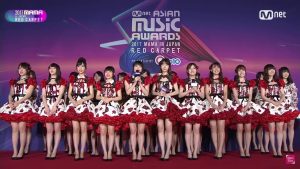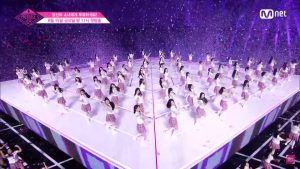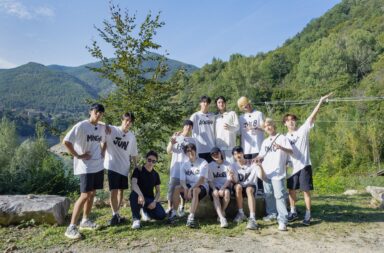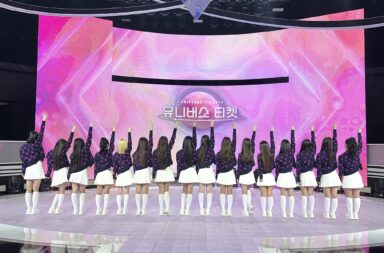 Ah, the crossover. Often strangely thrilling and fascinating, crossovers happen when two different worlds meet for the first time, creating a synergy that, more often than not, leads to the birth of something special and new. Nowadays, crossovers are everywhere.
Ah, the crossover. Often strangely thrilling and fascinating, crossovers happen when two different worlds meet for the first time, creating a synergy that, more often than not, leads to the birth of something special and new. Nowadays, crossovers are everywhere.
It’s no secret that the way we consume media has changed dramatically in the wake of globalisation and the Internet, but this is especially the case when it comes to crossovers. We’ve seen subculture after subculture cross over from its humble niche origins, often rooted in a specific country or ethnic group, into a global pop culture, consumed and loved by people all over the world. Hollywood, hip-hop, K-pop, and anime are only a few of the most prominent examples.
It seems that crossovers between these individual phenomena are the next stage of global pop culture’s continued evolution. For K-pop, this has meant venturing further out from South Korea than ever before, literally and culturally. Most recently, BTS has broken K-pop’s equivalent of the fourth wall to penetrate US media consciousness, performing at not one, but two American award shows. The proliferation of reaction videos, meanwhile, is a testament to the appeal and ease of creating crossovers on a miniature scale. The list goes on, but all in all, it’s a fascinating time to be alive and consuming pop culture, and especially K-pop.

Enter Produce 48, the latest in this series of previously implausible crossovers. If you’re unfamiliar with the franchise, Produce 48 is the third season of a Korean reality show produced by Mnet, pitting close to 100 wannabe-idol contestants against each other in an unforgiving survival competition and popularity contest, where they dance, sing and rap it out to earn viewers’ votes and claim one of 11-12 spots in the final girl or boy group. In doing so, they secure for themselves a 1-2 year contract and, perhaps more importantly, a potentially life-changing career boost in the extremely competitive K-pop industry.
Season 1 and 2, both known as Produce 101 due to their 101 participants, produced the successful groups I.O.I and Wanna One, respectively a female and male group composed of each season’s top talents. With a third season on the horizon, Mnet faced the challenge of keeping viewers, hooked on the show and invested in the final group, who will no doubt be compared with their seniors. With Mnet’s competitors JTBC and KBS airing remarkably similar shows in 2017, not to mention China’s media giants Tencent and iQiyi putting out their own spinoffs earlier this year, there is a higher potential that viewers are even more likely to be bored or disillusioned with the show’s format.
Enter AKB48, a Tokyo-based Japanese idol group formed in 2005, composed of over 120 girls in their early teens to mid-twenties. Holding the Guinness World Record for the largest pop group, AKB48 is one of the most commercially successful music acts in Japan, regularly selling millions of copies of singles and spawning numerous sister groups based in other Japanese cities as well as overseas, known collectively as the AKB48 Group.

Despite their impressive commercial success, however, their popularity and relevance among the general public is debatable; AKB48 may be well-known amongst Japanese people and even overseas, albeit more for their novelty, but they aren’t necessarily well-liked. They are known for pandering to the older male “otaku” demographic and using marketing gimmicks to inflate sales, and in recent years they have received less than lukewarm responses from the public; it doesn’t help that they now have K-pop to contend with, or that members’ faces are continually replaced by new ones thanks to their graduation system.
Still, AKB48 remain a powerful force to be reckoned with, and their popularity is rooted in an undeniably effective concept, revolving around the idea of the “unfinished” idol. AKB48’s creator and mastermind, Akimoto Yasushi, explained that because AKB48 members rarely start out good at singing or dancing, their individual charms are what attract fans to become their loyal supporters and cheerleaders, and this is what sets AKB48 apart from other groups. Depending on the individual, these charms could be as far flung from traditional idol activities as running a gaming YouTube channel, competently pro-wrestling on TV or simply being able to withstand the smell of a fart.
This contrasts starkly with the Korean idol system, where idols are expected to first and foremost perform flawlessly before they can be presented to the public, undergoing a gruelling training process if needs be. Of course, this isn’t surprising considering the amount of time and passion they have to invest into building and sustaining a career as an idol; the majority of K-pop idols have little to no life outside of work and so are not very interesting to people outside the context of their work – they usually make up for it by doing quality work instead and are judged accordingly

Essentially, the very definition of the word “idol” and the standards they are held to are completely different between the two sides. For Koreans, “idols” are skilled performers, while for AKB48, “idols” are personable entertainers. For a sharp TV producer, then, there exists a perfect gap in the reality show market for a competition pitting the two against each other.
Produce 48 is designed to fill this gap, bringing together 39 Japanese girls from AKB48 and 57 trainees from various Korean entertainment companies to create a 12-member girl group active for two and a half years across Korea and Japan. It’s a pop culture crossover of an unprecedented scale, on the surface an amicable intercultural exchange, but beneath that, a tense competition, aiming to answer once and for all the question: who does “idol” better?
Of course, this is a complex question with no single objective answer, but that won’t stop Produce 48 from trying, nor, crucially, will it stop curious viewers from tuning in to find out. Rather than attempt seriously to answer the question, what Produce 48 does instead is to rather ingeniously use the wonderful properties of a crossover to create something new and interesting, to the mutual benefit of both its contributors.
 By incorporating a new element, the crossover refreshes Produce 101’s content, allowing stories to be told and “characters” to appear that differ to what has gone before on Korean TV. Likewise, by exposing AKB48 members to the large international K-pop fandom and training them in now trendy K-pop performance skills, Akimoto can change AKB48’s image, bringing them up to date with current K-pop-influenced tastes and standards and increasing their international popularity.
By incorporating a new element, the crossover refreshes Produce 101’s content, allowing stories to be told and “characters” to appear that differ to what has gone before on Korean TV. Likewise, by exposing AKB48 members to the large international K-pop fandom and training them in now trendy K-pop performance skills, Akimoto can change AKB48’s image, bringing them up to date with current K-pop-influenced tastes and standards and increasing their international popularity.
The final group will likely draw fans of both the show and AKB48, creating a solid international fanbase that may well allow them to compete with the likes of Twice, one of the most popular K-pop girl groups in Japan right now, as well as the many other girl groups in Japan’s saturated idol industry. Finally, the crossover creates attention and discussion, which results in more eyeballs watching the show and extra publicity for AKB48 – something neither side could create on their own.
Of course, the collaboration is not without its potential problems. The strategy could backfire on either party if, for example, Mnet decides to edit the Japanese trainees unfavourably, or if the Korean audience outright rejects the show due to animosity towards the Japanese contestants, as initial reactions to the show suggested, might happen. How, then, has the reception to Produce 48 actually been so far?
 Despite various controversies, initial ratings and public interest in the show have in fact proved Produce 48 to be a hit. The first episode showed the Japanese contestants to be, as expected, far less technically able than their Korean counterparts, and for a while, the disapproving tone of the show put it at a real risk of becoming just an ego-stroking exercise for Korean viewers.
Despite various controversies, initial ratings and public interest in the show have in fact proved Produce 48 to be a hit. The first episode showed the Japanese contestants to be, as expected, far less technically able than their Korean counterparts, and for a while, the disapproving tone of the show put it at a real risk of becoming just an ego-stroking exercise for Korean viewers.
With the introduction of the show’s “main character”, however, the narrative quickly changed, going from “AKB48 are inferior” to “AKB48 are the underdog”. Leading this change as the unspoken heroine of the show is Sakura Miyawaki, one of the most senior and popular AKB48 Group participants, who has quickly gained a large following for her humble and hardworking attitude and solid performance skills, and her stunning and refreshingly different looks, keeping up with her Korean contemporaries surprisingly well and landing the elusive centre position for the show’s theme song, “Nekkoya (Pick Me)”.
 Her appeal has converted both international and Korean viewers, with her individual fancam earning well over a million views on both YouTube and Naver. In fact, four episodes in, we’ve seen numerous Japanese trainees’ popularity, far from tanking, rise to surprising heights, despite the apparent skill gap; in the most recent ranking, AKB48 members occupied almost half of the top 12 spots. Clearly, the majority of Korean viewers are open to accepting AKB48 members as part of a group, and their narrative as hardworking, improving underdogs in a harsh foreign environment is doing them a lot of favours; at this stage, at least, they are the most interesting aspect of the show.
Her appeal has converted both international and Korean viewers, with her individual fancam earning well over a million views on both YouTube and Naver. In fact, four episodes in, we’ve seen numerous Japanese trainees’ popularity, far from tanking, rise to surprising heights, despite the apparent skill gap; in the most recent ranking, AKB48 members occupied almost half of the top 12 spots. Clearly, the majority of Korean viewers are open to accepting AKB48 members as part of a group, and their narrative as hardworking, improving underdogs in a harsh foreign environment is doing them a lot of favours; at this stage, at least, they are the most interesting aspect of the show.
As far as editing goes, Mnet’s has been, as ever, as unsubtle as it is unscrupulous. Notorious for their “evil editing”, Produce 48 has had more than its fair share of absurd moments, including a poor choice of video splice causing trainees to react to themselves, frankly creepy zoom-ins on trainees’ throats gulping and a single voice crack being replayed no less than five times in a row. Still, you can’t deny that it makes for entertaining TV, and at this stage, it’s more comical than anything.
From the moment of its conception, Produce 48 had the potential to be a gamechanger, and it has been fulfilling this potential very well, for now. The fact that there are even Japanese trainees in the top 12 is proof of this; risky as it was, bringing AKB48 members in was probably one of the best decisions Mnet has made for the third season, revitalising a stagnating concept and offering to its viewers and the K-pop industry something genuinely new and exciting.

However, the show remains unbalanced in its depictions of Japan’s idol industry relative to Korea’s. It has chosen to imply that the Japanese trainees are simply untalented and lacking in skill compared to the Korean trainees. In fact, successful AKB48 members have their own very unique skill set, and the factors which have been responsible for AKB48’s monumental success have yet to be fully explored in the show.
As such, it’s arguable whether having AKB48 members conform to narrow K-pop standards is fair to them or beneficial to anybody. They have their own charm and concept which has evidently worked for them, and there are no signs yet of any attempt to combine these special features with that of K-pop to make something new. Until that happens, the winning twelve may well end up becoming just another generic K-pop group, and the world certainly isn’t lacking for those. A continued diversity of the Asian entertainment industry would be far preferable to K-pop-induced homogenisation.
Still, perhaps building the skills and expanding the influences of these girls will be enough to help them. Many of the AKB48 girls have spent years in stagnation, hidden among a sea of members, and desperately need a chance to reinvent themselves; Produce 48 is a great way for them to find new friends, fans, and opportunities. Overworked and desperate-to-debut Korean trainees, similarly, might benefit from seeing the sheer joy with which AKB48 perform, and the genuine cheer they bring to their audience. Crossovers are a powerful thing, after all, and the interactions that this show is bringing may well give rise to a change in the wind.
VIVIEN WU is a designer by day and an illustrator and writer by night. Having done a degree in economics at the University of Warwick and spent a year studying abroad in Tokyo, she has decided to do something completely unrelated and is now paying the price. Things she has been into way too long for them to be phases include listening to K-pop, playing guitar in amateur bands, reading manga and wasting large amounts of time on YouTube.
(Images via Mnet, ABC, JYP Entertainment, AKS.)



